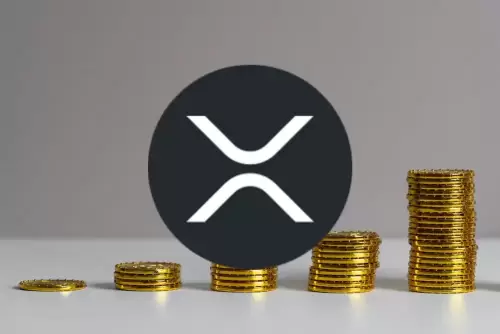 |
|
 |
|
 |
|
 |
|
 |
|
 |
|
 |
|
 |
|
 |
|
 |
|
 |
|
 |
|
 |
|
 |
|
 |
|
Cryptocurrency News Articles
Movement Labs, the World Liberty Financial-backed crypto project, is facing heavy backlash and internal dissent
May 16, 2025 at 03:00 am
Movement Labs, the World Liberty Financial-backed crypto project, is facing heavy backlash and internal dissent as quiet promises of large token stakes

Movement Labs, the World Liberty Financial-backed crypto project, is facing backlash and internal dissent as quiet promises of large token stakes made to early insiders have come to light.
The previously undisclosed deals have raised fresh questions about who is running things behind closed doors.
Movement Labs gets caught up in under-the-table arrangements
Before its token launch, Movement Labs reportedly committed large portions of MOVE’s supply to a spattering of early advisers, an action it kept hidden from investors that only surfaced via internal documents.
According to two business memos obtained by CoinDesk, Movement, which was founded in 2023 by two 20-year-old Vanderbilt dropouts, used these advisers as a crutch to gain a foothold in the crypto industry.
However, Movement Labs has said the agreements, dated shortly after the project’s founding, were exploratory in nature and non-binding.
Still, the existence of the agreements highlights the chaotic inner workings of Movement Labs, which is still licking its wounds after it came under fire last month for market-making deals that facilitated token dumping by insiders.
That insider trading pissed many off, but the fallout from the revealed commitment to advisers is taking that anger to the next level. There are also many within the company playing the blame game, focusing on how Movement was steered into a predatory agreement with a Chinese market maker under terms that reportedly encouraged predatory selling.
There is now a public rift between Movement Labs’ co-founders Rushi Manche, who was dismissed this month, and Cooper Scanlon, who is no longer the CEO but remains at the company.
Manche claims he was merely the CTO leading the engineering team when they started Movement and as such, left most of the business decisions, including the contracts, to Cooper.
“When priorities changed, our roles changed, but Cooper’s decisions in the early days heavily shaped the way the launch went,” Manche told CoinDesk in an interview.
Movement Labs’ shadow advisers
According to more than a dozen people familiar with Movement, including current and former employees who were granted anonymity so they could speak more candidly, the agreements concern Sam Thapaliya and Vinit Parekh, both of whom played significant roles in shaping the project during its early stages.
Thapaliya, the CEO of Zebec Protocol, was reportedly loaned 5% of MOVE’s supply for marketing and market-making purposes, according to one of the agreements obtained by CoinDesk.
Another agreement dated March 2023, allocated Thapaliya 2.5% of the token’s total supply, which is worth more than $50 million at recent prices.
Movement Labs is adamant that the signed agreements with Thapaliya were not binding, but Thapaliya claimed the agreements “were never voided.”
A memorandum of understanding is normally considered non-binding, but the agreements also include provisions that make it impossible for them to be voided except with the consent of “both parties.”
“I plan on pursuing legally to exercise my claim to retrieve 2.5% of tokens,” Thapaliya, who was tagged a “shadow founder” by employees of Movement Labs, has said.
His name also came up in internal communications regarding Movement’s deal with Web3Port, a Chinese market maker that was later blamed for dumping $38 million in tokens after MOVE’s debut.
Vinit Parekh is the second name that came up in the subject of shadow founders linked to Movement Labs. CoinDesk claims a 2023 agreement saw Movement Labs agree to give Vinit Parekh’s “Digital Incubation Group” $50,000 annually for every $1 million raised by Movement Labs.
There was also another agreement that granted a separate Parekh entity control of 2.5% of the MOVE token supply.
In exchange for his allocation, Parekh’s firm, Digital Incubation Group, was tasked with several things, including the development of strategy framework, tokenomics, and engaging in structuring team pre-product launch.
Parekh’s agreements were also structured as memoranda of understanding with a termination clause requiring consent from both “parties.” However, Parekh and Movement Labs have tagged the agreements exploratory and claimed that funds never changed hands between either party.
Nevertheless, sources close to Movement Labs have said that Parekh, a Microsoft product manager turned blockchain industry consultant, was a constant presence at Movement’s San Francisco office.
However, unlike Thapaliya, Parekh has claimed the arrangement was out of love for the ecosystem and that no money has changed hands between his party or Movement Labs.
The fallout from the scandal has now drawn attention to the widening rift between its co-founders, Manche and Scanlon.
After an excerpt from one of the Thapaliya agreements leaked on X, Manche highlighted his former partner’s role in approving the deal by pointing to Scanlon’s signature on the memo. He also shared
Disclaimer:info@kdj.com
The information provided is not trading advice. kdj.com does not assume any responsibility for any investments made based on the information provided in this article. Cryptocurrencies are highly volatile and it is highly recommended that you invest with caution after thorough research!
If you believe that the content used on this website infringes your copyright, please contact us immediately (info@kdj.com) and we will delete it promptly.
-

-

- Barstool Sports Founder Dave Portnoy Asks: "What if XRP is the Next Bitcoin?"
- May 16, 2025 at 05:40 pm
- In a short video clip recently shared by crypto enthusiast Amelie on X, American businessman and Barstool Sports founder Dave Portnoy sparked a wave of discussions within the cryptocurrency community.
-

-

-

- Marinade's MNDE token surged 30% after unveiling instant SOL withdrawals and a new creator rewards program, as Solana's DeFi activity rebounds.
- May 16, 2025 at 05:30 pm
- Marinade's governance token MNDE (MNDE) shot up nearly 30%, briefly hitting $0.17, as the Solana-based liquid staking protocol rolled out a wave of updates aimed at reviving community engagement and token utility.
-

-

- Ethereum (ETH) Price Prediction: Holding Firm Near $2,592 After Tagging Highs
- May 16, 2025 at 05:25 pm
- Following last week's explosive breakout from the $1,900 consolidation zone, ETH has entered a sideways grind below the $2,600–$2,700 resistance cluster, signaling the potential for short-term indecision as traders digest recent gains. Despite the stall, ETH remains in a strong uptrend across all major timeframes, with the broader sentiment supported by a bullish break above multi-month descending trendlines.
-

-



























































